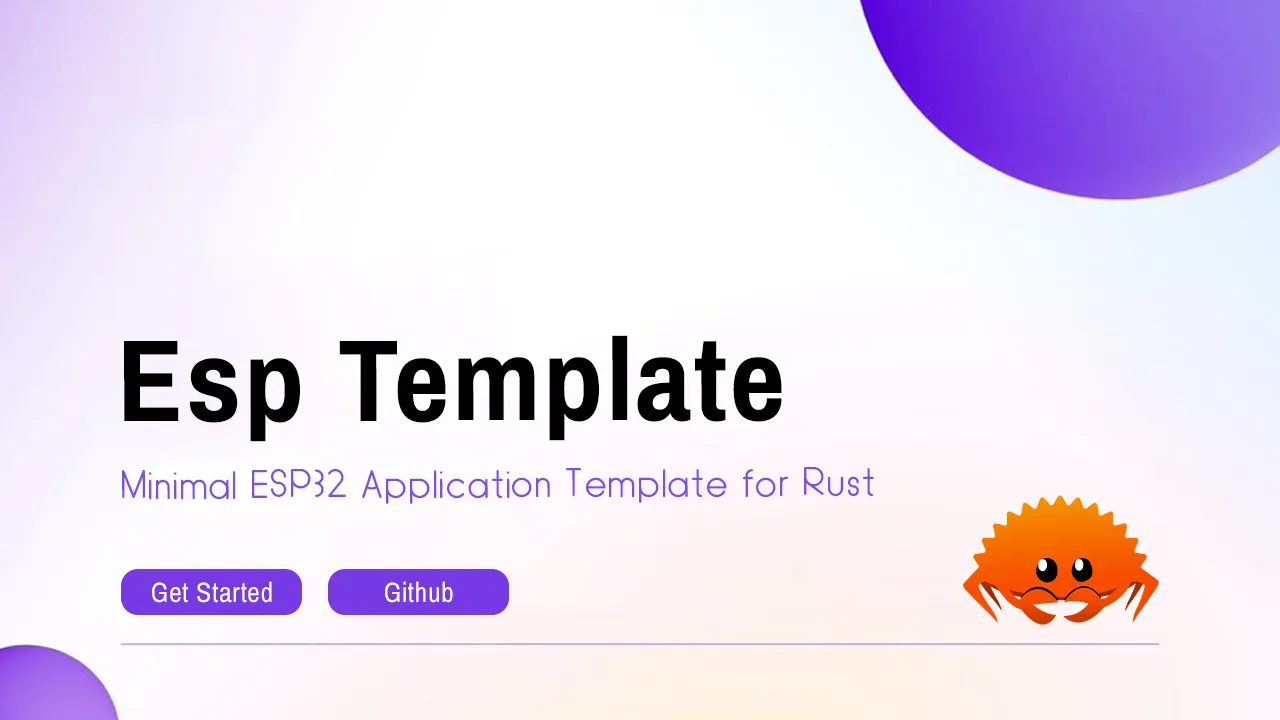Esp Template: Minimal ESP32 Application Template for Rust
esp-hal
Hardware Abstraction Layer crates for the ESP32, ESP32-C2/C3/C6, ESP32-H2, and ESP32-S2/S3 from Espressif.
These HALs are no_std; if you are looking for std support, please use esp-idf-hal instead.
This project is still in the early stages of development, and as such there should be no expectation of API stability. A significant number of peripherals currently have drivers implemented (you can see a full list here) but have varying levels of functionality. For most basic tasks, this should be usable already.
If you have any questions, comments, or concerns, please open an issue, start a new discussion, or join us on Matrix. For additional information regarding any of the crates in this repository, please refer to the crate's README.
| Crate | Target | Technical Reference Manual |
|---|---|---|
| [esp32-hal] | xtensa-esp32-none-elf | [ESP32] |
| [esp32c2-hal] | riscv32imc-unknown-none-elf | [ESP32-C2] |
| [esp32c3-hal] | riscv32imc-unknown-none-elf | [ESP32-C3] |
| [esp32c6-hal] | riscv32imac-unknown-none-elf | [ESP32-C6] |
| [esp32h2-hal] | riscv32imac-unknown-none-elf | [ESP32-H2] |
| [esp32s2-hal] | xtensa-esp32s2-none-elf | [ESP32-S2] |
| [esp32s3-hal] | xtensa-esp32s3-none-elf | [ESP32-S3] |
Quickstart
If you have not already, we strongly encourage you to read The Rust on ESP Book prior to starting.
We recommend using cargo-generate and esp-template in order to generate a new project. This will allow you to generate a minimal project skeleton with all the required dependencies and configuration ready to go.
You can install cargo-generate and generate a new project by running:
$ cargo install cargo-generate
$ cargo generate -a esp-rs/esp-template
For more information on using this template, please refer to its README.
Ancillary Crates
There are a number of other crates within the esp-rs organization which can be used in conjunction with esp-hal:
| Crate | Description |
|---|---|
| [esp-alloc] | A simple no_std heap allocator |
| [esp-backtrace] | Backtrace support for bare-metal applications |
| [esp-ieee802154] | Low-level IEEE802.15.4 driver for the ESP32-C6 and ESP32-H2 |
| [esp-println] | Provides print! and println! implementations |
| [esp-storage] | Implementation of [embedded-storage] traits to access unencrypted flash memory |
| [esp-wifi] | no_std Wi-Fi/Bluetooth LE support |
MSRV
The Minimum Supported Rust Versions are:
1.65.0for RISC-V devices (ESP32-C2, ESP32-C3, ESP32-C6, ESP32-H2)1.65.0for Xtensa devices (ESP32, ESP32-S2, ESP32-S3)1.67.0for allasyncexamples (embassy_hello_world,embassy_wait, etc.)
Note that targeting the Xtensa ISA currently requires the use of the esp-rs/rust compiler fork. Our recommend method of installation is espup.
RISC-V is officially supported by the official Rust compiler.
Git Hooks
We provide a simple pre-commit hook to verify the formatting of each package prior to committing changes. We strongly encourage use of this git hook.
The hook can be enabled by placing it in the .git/hooks/ directory:
$ cp pre-commit .git/hooks/pre-commit
When using this hook, you can choose to ignore its failure on a per-commit basis by committing with the --no-verify flag; however, you will need to be sure that all packages are formatted when submitting a pull request.
License
Licensed under either of:
- Apache License, Version 2.0 (LICENSE-APACHE or http://www.apache.org/licenses/LICENSE-2.0)
- MIT license (LICENSE-MIT or http://opensource.org/licenses/MIT)
at your option.
Contribution
Unless you explicitly state otherwise, any contribution intentionally submitted for inclusion in the work by you, as defined in the Apache-2.0 license, shall be dual licensed as above, without any additional terms or conditions.
Download details:
Author: esp-rs
Source: https://github.com/esp-rs/esp-template
License: Apache-2.0, MIT licenses found
